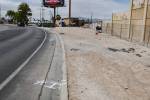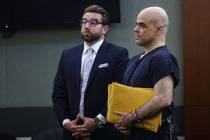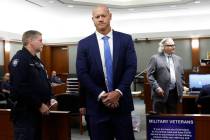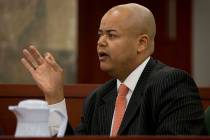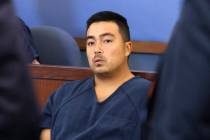Three accused of giving prostitutes phony counseling certificates



Brandon Snowden was supposed to throw away three bags of shredded, potentially incriminating documents from the office files of attorney Brian Bloomfield following a police raid in April 2010.
Instead, the former office runner, a felon who once was a trusted Bloomfield aide, gave the evidence to a Las Vegas police detective investigating the criminal defense lawyer, according to county grand jury transcripts.
And that turned Snowden into one of the star witnesses in the criminal case against Bloomfield and two others charged with carrying out a scam that provided prostitutes and others with phony certificates of completion for court-ordered counseling and community service.
A police forensic scientist, with the help of two lab technicians, spent 2½ months assembling — piece by shredded piece — a pile of documents that played a role in helping prosecutors obtain a 52-count indictment against Bloomfield, 36. Juvenile probation officer Robert Chiodini, 41, and former counseling service owner Steven Brox, 46, also were charged.
The three defendants face a variety of felony and gross misdemeanor charges, including forgery, conspiracy to commit a crime and offering a false instrument for filing or record.
The indictment also accuses the three men of conspiring to shred the documents and hide them from authorities to cover up crimes they say were committed between February 2008 and May 2010.
Part of that conspiracy is alleged to include “destroying” or “erasing” data from Bloomfield’s seized office computer shortly after police returned it to him.
Snowden testified that he and Bloomfield took the computer to an expert to remove most of the data and transfer it to an external hard drive.
Bloomfield and the other defendants all have pleaded not guilty, and no trial date has been set. Bloomfield’s attorney, William Terry, declined to comment for this story.
Snowden, 28, who has convictions for theft and forgery in 2005, was ultimately fired at Bloomfield’s office. He currently faces robbery and kidnapping charges.
In his Dec. 20 testimony before the grand jury, Snowden said he turned over the shredded documents on his own volition and police gave him no incentives to cooperate.
At the time of Snowden’s testimony, however, a bench warrant had been issued for his arrest for failing to show up for a hearing in his robbery case, court records show.
Police records do not show Snowden in custody, and he could not be reached for comment.
Bloomfield had been representing Snowden in the robbery case, but ended up withdrawing in November. No new attorney of record is listed in the case.
Snowden testified how he helped purge and shred the files from Bloomfield’s office at a late-night rendezvous with the lawyer, his 28-year-old girlfriend, Amber McDearmon, and a local bail bondsman.
Bloomfield told Snowden that the three others had walked over from the nearby bail bonds office to avoid being followed by police.
The purging occurred on the evening of an April 27, 2010, police raid at Bloomfield’s law office at 810 S. Casino Center Blvd.
Bloomfield told the group they needed to pull documents from cases involving Brox and his former company, United States Justice Associates, which had been offering counseling services at the time of sentencing in mainly misdemeanor cases in Las Vegas Justice Court, Snowden testified.
Several months earlier, police had executed search warrants at United States Justice Associates, a company that regularly had been doing business at the Regional Justice Center.
Records also were pulled for a company associated with Chiodini, a juvenile probation officer for Clark County since May 2001, Snowden testified.
Snowden told the grand jury that after only about 45 minutes he was left to finish up removing the files.
“I mean when you have four people going through files and pretty much knowing what they’re looking for, it doesn’t take long,” he said.
Bloomfield left the office under the impression Snowden was going to shred the documents and toss them in dumpsters at other locations in town, Snowden testified.
“OK, you’re going to get rid of it. You said you asked (Bloomfield) about shredding,” Chief Deputy District Attorney Mike Staudaher asked Snowden.
“Right,” Snowden responded. “And he basically said, ‘Yes, we’ll shred it.’ ”
Snowden ended up filling three trash bags. But instead of throwing them away that night, he kept them and later turned them over to Aaron Stanton, the lead Las Vegas police detective in the investigation.
“And they were not small trash (bags) like the garbage can under your desk,” Snowden said. “It was the big garbage can, like the 35-gallon trash bags. They were pretty large.”
On Sept. 20, Stanton, who works in the Criminal Intelligence Section, asked forensic scientist Jan Seaman Kelly to put back together some of the shredded documents.
Kelly described for the grand jury her painstaking process of putting together the documents, which included overtime hours to accommodate the investigation.
Kelly testified that she reconstituted enough documents and partial documents by Dec. 7 to help Stanton move forward with the investigation.
In his testimony, Snowden said he did other things for Bloomfield, including taking envelopes filled with cash to United States Justice Associates and picking up certificates of completion for counseling programs for clients, mostly prostitutes.
The clients were supposed to fill out workbooks provided by Brox’s company, but Snowden said he never picked up or delivered any workbooks.
After police raided United States Justice Associates in November 2009, Bloomfield started using another company that specialized in court education programs, LRS Systems, Snowden testified.
Clients could complete court-ordered counseling online at LRS systems.
At some point, Snowden said, he needed extra money, so he asked Bloomfield to do more work around the office, and Bloomfield suggested doing the online programs for his clients.
“So these are clients, if I understand correctly, that were instructed by the court to complete some sort of online class?” Staudaher asked.
“Uh huh,” Snowden responded.
“And Mr. Bloomfield has asked you to do the class for the client?”
“Correct.”
Snowden said Bloomfield told him the classes, mostly for AIDS awareness, cost $150, and that Bloomfield would pay him $50 for each class he took online.
All Snowden had to do to get started was create an email account for the client, he testified.
The first class took him nearly four hours, but after that it became easier, and he found that he could do two classes simultaneously from his office computer, usually after hours.
Staudaher asked Snowden how he knew which clients needed to have the classes taken.
Snowden responded: “Mr. Bloomfield would either leave me a little note in my box, or I would have a little Post-it note sitting on my chair, or he’d call me into his office and be like, ‘Hey can you do this tonight or whenever?’ ”
Snowden said he often would pay for the class with his debit card and Bloomfield would reimburse him with the additional $50 for his work.
“So the certificate would say that the person who you were doing it for had actually taken the class?” Staudaher asked.
“Correct,” Snowden responded.
Snowden testified that he provided Bloomfield with the certificates, and they would be placed in the files of the clients and then given to the courts to show that the clients had fulfilled the sentencing requirements.
Contact Jeff German at jgerman@reviewjournal.com or 702-380-8135.





